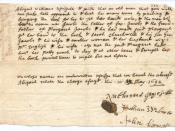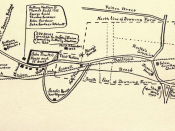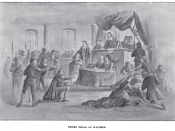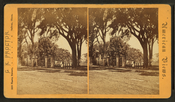Reverend Hale is a dynamic character in Miller's The Crucible as he is challenged by John Proctor's courage. He starts out very convincing and seems to know exactly what he wants. John Proctor is a very strong and courageous character. He influences Reverend Hale so much that Hale completely changes his mind about Salem, the court, and witches.
Reverend Hale enters Salem as a very strong character that knows what he wants to do. He is very sure of himself. "They must be, they are weighted with authority" (p. 36). When he arrives in Salem, he is absolutely sure of witchcraft. "The devil is precise-the marks of his presence are as definite as stone." (p. 38), "Are you gathering souls for the devil?" (p. 44); "Who came to you with the devil?" and ".perhaps another person in the village?" (p. 45). A few of his faults are that he judges too much by appearances, ".you
look as such a good soul should" (p. 37); ".a claim so weighty cannot be argued by a farmer," (p. 99); and he uses people to question other people. "How can you bear to see this child suffering?" (p. 45); "In the book of record Mr. Parris keeps." (p. 64); "The man's ordained, therefore he must have the light of god in him." (p. 66). Reverend Hale has a lot of wisdom to share with Salem. "Man, remember, until an hour before the devil fell, God thought him beautiful in heaven," (p. 71); ".private vengeance is working through testimony," (p. 114).
John Proctor is a strong and courageous character who will not give in easily to his accusers. In the end of The Crucible he denies the charges of witchcraft.
He says he will never confess that. He could be free of charges if he confesses, but it is a false accusation and he doesn't want anything corrupting his name. He is a very good person who just wants to please everyone, especially his wife. He says, "I'll buy George Jacobs heifer. How would that please you?"; "I mean only to please you, Elizabeth." The fact that he only wants to please people is what gets him into trouble. He tries too hard to tell people only what they want to hear.
This all results in Hale changing his mind about the court, the witches, and Salem. He is very disappointed with how the people of Salem acted. He was outraged by the way they accused people they didn't like of being witches, just so they would have to deal with them anymore. He hated the way the girls who cried out did it all following Abigail Williams.
He despised the way so many people jumped to conclusions about the people that they had known since they were children, people who were their neighbors, their friends, and sadly even their spouse or children. He decides to completely leave the court, and try to defend the victims of the girls, crying out, "I quit this court" (p. 120). He knows that people were making false accusations about the witches, and he knows that if he hadn't showed up talking about the witches, it probably wouldn't have happened that way. He tries to get people out of trouble to make up for his mistakes. "Excellency, it is enough he confess himself," (p. 141).
This shows Reverend Hale turns into a dynamic character in Miller's The Crucible when he's challenged and amazed by the courage of John Proctor.
At the beginning, he is a very unfaltering character and seems to know exactly what he wants to accomplish in Salem. John Proctor starts a very solid and brave character and remains that way throughout the book.
John Proctor's influence on Reverend Hale is so great that Hale completely changes his mind about Salem, the court, and the witches.





